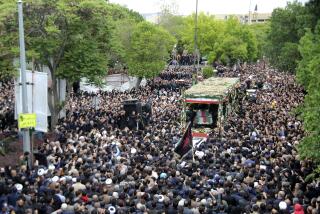Chopper Crash Kills Two Soldiers
- Share via
BAGHDAD — The U.S. military confirmed Monday that two soldiers died when their AH-64 Apache helicopter crashed in a swampy area near Taji earlier in the day while on combat patrol. It was the third helicopter loss suffered by coalition forces since Jan. 7.
Although the military command said the cause of the crash was under investigation, two insurgent groups claimed responsibility. One of the groups, the Mujahedin Army, released a video over the Internet purporting to show a shoulder-fired missile striking the helicopter.
The identities of the two soldiers killed were withheld Monday pending notification of their families. The soldiers were attached to Task Force Ironhorse. Their aircraft was the 32nd helicopter loss since the U.S.-led invasion began in March 2003.
Although Iraqi officials say the overall level of violence has declined in the last week, assassinations of prominent figures continued Monday. Sheik Nasr Abdul Kareem, a physics professor and respected tribal leader, was killed by gunmen while he was driving to work in Ramadi, about 70 miles west of Baghdad.
U.S.-led forces had approached the sheik about helping mediate local violence. He had participated in meetings with American military commanders who have been trying to engage city leaders in an effort to drive a wedge between radical Islamist groups and local Sunni Arab militants.
In other violence, Iraqi authorities said a car blew up next to a police convoy in Muqdadiya, about 60 miles northeast of Baghdad. A medic at the city’s main hospital said the blast killed five officers and a 6-year-old child, and injured 16 civilians and three policemen.
Monday’s helicopter crash occurred in a farm area about 25 miles north of Baghdad. Residents reported seeing the helicopter on fire while in flight, then hearing huge explosions after its fall. A half-dozen U.S. helicopters soon arrived, and soldiers sealed off the area to look for suspects.
Last Friday, two pilots were killed when their two-seat OH-58D Kiowa helicopter was shot down by insurgents in Mosul in northern Iraq. On Jan. 7, eight coalition soldiers and four civilians were killed when their UH-60 Black Hawk chopper went down in what spokesmen have said was a weather-related crash.
Losses of helicopters to hostile fire have occurred in clusters. Between April 21 and May 31 of last year, three choppers were shot down, as were four between Jan. 22 and Feb. 25 the year before. Observers have theorized that insurgents notice flight and scheduling patterns of the aircraft and then launch their attacks accordingly.
In response to last year’s attacks, U.S. commanders ordered that tactics and flight procedures for the helicopter fleet be altered and that fewer fly during daylight hours.
Meanwhile, U.S. Embassy officials on Monday offered a review of aid programs funded by the $20.9 billion appropriated by Congress for Iraq reconstruction in 2003. They said U.S. aid would continue after the budgeted funds run out this fall, though a wide spectrum of government officials and analysts say they expect the amount to be significantly reduced.
The officials said the end goal of U.S. assistance is to help Iraq wean itself from American subsidies and achieve independence under a “market-based economy.” How much U.S. aid for Iraq will be forthcoming won’t be known until President Bush presents his fiscal 2006-07 budget proposal next month.
The officials acknowledged that restoring Iraq’s electricity grid, at a cost of $4.3 billion, has taken more time and resources than anticipated, but that the project is crucial to Iraq’s economic future. The amount included the cost of two new power plants, one near Basra in the south that is now online and another under construction near Kirkuk in the northeast.
Although much of Baghdad is without power for most of the day, the rest of the nation averages 10 to 12 hours of power daily, an improvement, officials said.
Times staff writers Louise Roug in Baghdad and Mark Mazzetti in Washington contributed to this report.
More to Read
Sign up for Essential California
The most important California stories and recommendations in your inbox every morning.
You may occasionally receive promotional content from the Los Angeles Times.













